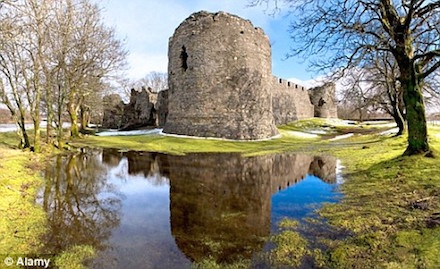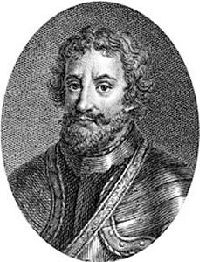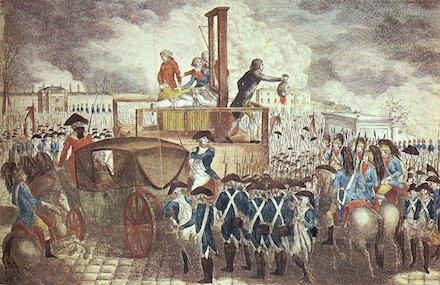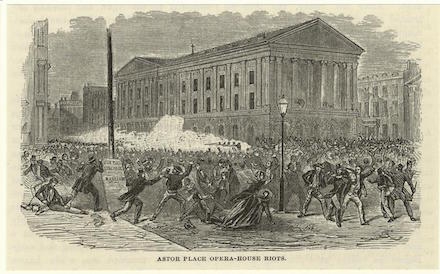"From hence to Inverness..." (Act 1, Scene 4)
The choice to set Macbeth in Scotland was certainly strategic on Shakespeare's part. James VI of Scotland had inherited the English throne in 1603 when his relative Elizabeth died without a direct heir. The first monarch to rule both countries, James was also thought to be the descendent of the character Banquo from the play. (In reality, Banquo was not a real historical person.) Shakespeare wrote the witches' prophecy about a line of kings stretching out endlessly from Banquo to suggest the stability and longevity of James's rule.
Scotland actually serves the play more in terms of geography and atmospherics than history. Scotland had historically been a somewhat desolate and barbaric place in the English imagination, full of wild moors and gloomy coastline. Scotland lacked the kind of large center of power that London provided for England so authority was dispersed. Thanes occupied scattered strongholds across the country, making national defense difficult and infighting common. Scotland's rugged and remote sea borders to the north made it vulnerable to invasion, and when Macbeth opens they are at war with Norway.
Today, Scotland boasts about 3,000 castles, many of them older than Shakespeare's play. Some of them, steeped in the turbulent Scottish history that Macbeth evokes are mentioned. When you come to the show, see how many references to Scottish places you can catch!
"Had he not resembled my father as he slept..." (Act 2, Scene 2)
Macbeth is not just a great tragedy, but also a history play — though a fascinatingly unfaithful one. Macbeth was King of Scotland in the eleventh century, and his claim to the throne was about as strong as Duncan's; they were in fact both grandsons of the same previous king. Macbeth did take the throne by killing King Duncan in 1040, but it was on the battlefield and nothing as covert as Shakespeare's play stages.
Lady Macbeth was also a historical figure, a woman named Gruoch, and she was a descendent of a different earlier king. This little-known fact brings interesting depth to Lady Macbeth's reason for not killing King Duncan herself: "Had he not resembled my father as he slept, I had done it" (2.2). Interestingly, Lady M had been married before, and her first husband was killed by Macbeth — who then married her and became stepfather to her son from that first marriage.
Together, Macbeth and Lady Macbeth ruled peacefully over Scotland for seventeen years until Macbeth was killed in battle when Duncan's son Malcolm returned from England. Is there a trace of this fair/foul history in Shakespeare's play? And did Shakespeare improve on history with the changes he made to the story? Come and see for yourself!
"Ring the alarum bell! Murder and Treason!" (Act 2, Scene 3)
The English theatres were closed from 1642-1660, and in the century that followed their reopening, Shakespeare's Macbeth was rarely performed, existing mainly as a much-changed adaptation by William Davenant. Yet by the late eighteenth century, Macbeth was back on the English stage in all its gore and glory and enjoying more productions and acclaim than ever before. The play clearly struck a chord with eighteenth century writers and actors, as well as audiences. Allusions and lines from Macbeth showed up in the work of Godwin, Wordsworth and Baillie, and Sarah Siddons became one of England's most loved actresses playing a ferocious and impassioned Lady Macbeth.
What was it about the end of the eighteenth century that brought Macbeth back to prominence? The French Revolution, with its King-killing and its spectacularly bloody aftermath, were shocking and worrisome for much of England. The English had an unpopular leader of their own in Prime Minister William Pitt, and a mad king prone to the kind of inexplicable outbursts that Macbeth demonstrates at the feast table. English playwrights during this period were heavily censored and unable to write directly about politics, so perhaps Macbeth's act of regicide and reign of terror account for why Macbeth became THE play of the revolutionary years — and has enjoyed ongoing attention ever since.
"Is this a dagger which I see before me...?" (Act 2, Scene 1)
Much of the danger in Macbeth comes from a fear that mysterious powers are exerting influence and ill luck on human affairs. When Shakespeare wrote Macbeth, the witches — with their creepy cauldron ingredients and weird predictions — tapped into a deep vein of superstition perpetuated by the publication of King James's Demonology in 1597.
Whether or not people still believe in witches today, something of Macbeth's own superstition and misfortune have attached to the history of a play many actors only dare to call "The Scottish Play." The curse of Macbeth, allegedly caused by witches, has prompted many rumors — some of them more easily dismissed than others. The claim that the first actor ever to play Lady Macbeth died on opening night is problematic due to uncertainty over both the cast and date of the first production. On the other hand, a dispute about whether English actor W.C. Macready or American actor Edwin Forrest was the better Macbeth, did result in the Astor Place Riots in 1849, which killed more than 20 people and injured 100 more. Macbeth was the inaugural production of the new Covent Garden season in 1809 when riots also broke out. Some say Lincoln was reading Macbeth the night before he was killed...in a theatre!
Reports of injured or dead actors are particularly plentiful, including Laurence Olivier's near miss with a stage weight, Kenneth Branagh's accidental stabbing of an actor in his cast, and the death of Harold Norman, who died from injuries sustained in battle in a 1947 production. The unfortunate use of real swords accounts for many of these injuries, bringing Macbeth's suspicious words "Is this a dagger which I see before me" some ironic weight.
Come and see it — if you dare!